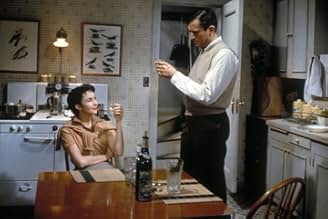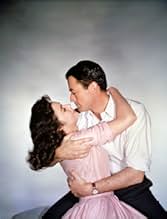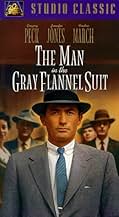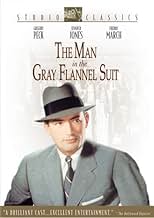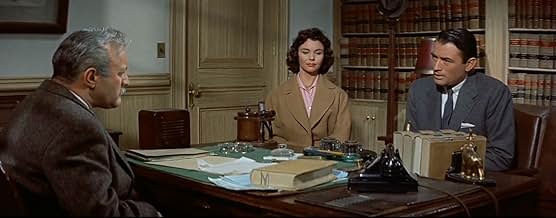IMDb-BEWERTUNG
7,1/10
4356
IHRE BEWERTUNG
Mittelständler Tom Rath hat mit seiner ehrgeizigen Gattin Betsy und den Schatten der Vergangenheit zu kämpfenMittelständler Tom Rath hat mit seiner ehrgeizigen Gattin Betsy und den Schatten der Vergangenheit zu kämpfenMittelständler Tom Rath hat mit seiner ehrgeizigen Gattin Betsy und den Schatten der Vergangenheit zu kämpfen
- Regie
- Drehbuch
- Hauptbesetzung
- Auszeichnungen
- 1 Gewinn & 3 Nominierungen insgesamt
Tristram Coffin
- Byron Holgate
- (Gelöschte Szenen)
William 'Bill' Phillips
- Antonio Bulaga
- (Gelöschte Szenen)
Empfohlene Bewertungen
Ten years after Gregory Peck and Jennifer Jones lit up the screen with their torrid love-hate relationship in "Duel in the Sun," they were reunited in this engrossing business-domestic drama.
The two were surrounded by a great cast, headed by Fredric March and Lee J. Cobb, to offer a sincere portrait of a junior Madison Avenue exec who must choose between being a "big CEO" or a "second-tier nine-to-fiver".
Director/screenwriter Nunnaly Johnson guided the actors in uniformly well-modulated performances, all deeply felt and cleanly expressed. Keenan Wynn offered a surprisingly subtle and touching performance as well, in a film produced by Darryl F. Zanuck, with a Bernard Herrmann score.
What a treat it is to watch these fine thespians breathe life into most intriguing characters from Sloan Wilson's thoughtful novel.
The two were surrounded by a great cast, headed by Fredric March and Lee J. Cobb, to offer a sincere portrait of a junior Madison Avenue exec who must choose between being a "big CEO" or a "second-tier nine-to-fiver".
Director/screenwriter Nunnaly Johnson guided the actors in uniformly well-modulated performances, all deeply felt and cleanly expressed. Keenan Wynn offered a surprisingly subtle and touching performance as well, in a film produced by Darryl F. Zanuck, with a Bernard Herrmann score.
What a treat it is to watch these fine thespians breathe life into most intriguing characters from Sloan Wilson's thoughtful novel.
A man, feeling pressure from his wife for a better lifestyle, takes a new job with increased pay but added stress. To make matters worse, he becomes embroiled in legal actions concerning an inheritance from his grandmother. On top of all this, he learns that some of his actions in Italy during World War 2 have come to haunt him. This is a well told story with many sides to it, and I feel the use of flashback went a long way in making it even better. Well worth seeing.
I was pleased to get a chance to see this movie -- at least half of it -- during a bout of insomnia. The title was a catchphrase for corporate America for many, many years, a kind of symbol for overachieving, aggressive, ambitious businessmen without principles -- in other words, the "suits."
Though I am generally wary of Gregory Peck's (and Jennifer Jones') tendency to niceness, I was impressed by their work here. Their relationship was both substantial and subtle. Jennifer Jones had much much more humanity and integrity than the average housewife portrayed in other films of the 50s and 60s. Peck's character respected her opinions and values.
But I was knocked out by Fredric March. His type A, workaholic executive was touching on many levels. His utter tiredness, alcoholic puffiness, and innate sadness was plastered over with a Willy Loman-like veneer of gung-ho, jolly-good-fellow false heartiness. How familiar that character was and is -- in real life. His ambition, greed and drive had become a habit, and like any junky, he was simply unable to quit. Despite the human losses. I will never forget the scene in his office, when his wife calls him up, and he slowly hangs up the phone.
A very fine film, with many truths about our national character and obsessions....
Though I am generally wary of Gregory Peck's (and Jennifer Jones') tendency to niceness, I was impressed by their work here. Their relationship was both substantial and subtle. Jennifer Jones had much much more humanity and integrity than the average housewife portrayed in other films of the 50s and 60s. Peck's character respected her opinions and values.
But I was knocked out by Fredric March. His type A, workaholic executive was touching on many levels. His utter tiredness, alcoholic puffiness, and innate sadness was plastered over with a Willy Loman-like veneer of gung-ho, jolly-good-fellow false heartiness. How familiar that character was and is -- in real life. His ambition, greed and drive had become a habit, and like any junky, he was simply unable to quit. Despite the human losses. I will never forget the scene in his office, when his wife calls him up, and he slowly hangs up the phone.
A very fine film, with many truths about our national character and obsessions....
It's amazing this film came out of the 50's. It's even more true today, than it was then, now things are so rigidly stratified in our society that people can't even relate to considering being a Workaholic anything other than 'worthwhile' and 'normal'. Rat Race lifestyle, is all America is about now. Misery, stress, alienation, isolation; great material wealth but a dysfunctional society that has made little robots and zombies out of each of us. Remember how vibrant you felt as a child, how full of wonder? Remember being excited about the chance to play with other kids? Now we dread every minute of our lifestyle, yet still smile and say "things are going okay" when asked. What liars we have become. A culture of liars and cruel, vicious people, with plastic smiles frozen on our faces and our deep heartache and longing hidden away. This film shows that America has been on the wrong path for a long time and it's only gotten worse. Great film!! Peck is adequate, but considering the times he lived in, a pretty good performance. It's the writing and the messages of this film that stand out!!
This film is based upon an original screenplay by Nunnally Johnson, famous for his scintillating screenplays for THE MUDLARK (1950), MY COUSIN RACHEL (1952), and THE THREE FACES OF EVE (1957). The story must have had a great deal of personal importance for him, because he chose to direct it (it was one of 8 films which he directed between 1954 and 1960). However, Johnson was not a great director, he was somewhat uninspired in that department and had few dynamic camera angles or sense of how to heighten drama visually, and in my opinion, he became too close to this story and material, so that he lost perspective to a certain extent. The film made a big hit when it came out, largely because Gregory Peck was the star. But the film addressed a number of pressing social and moral themes in a direct and sometimes brutal manner, which was unusual for the fifties. And some of them are timeless, such as Peck's despairing comment about his wartime exploits as a Captain of a Parachute division: 'I killed seventeen men. Not people in the distance, but men I could look at and see, including a young soldier whom I stabbed to death so that I could take his coat.' By addressing the issue of the traumas of the returned soldiers, haunting them still ten years after the end of the War, this film was very topical, and touched on the very themes which lay at the bottom of all the American film noir of the late forties and the fifties. Another reason for the interest in the film at the time was because of the unusual treatment of Peck being employed in the newly created television industry, a job you went to in Manhattan in a suit which was, often, grey flannel (hence the title). Jennifer Jones plays Peck's wife. Her role is surprisingly small, but most of it consists of her doing hysteria with tormented and streaming eyes, in the way she always did so well. Her husband Daryll Zanuck produced the film. There are good supporting roles for Lee J. Cobb, Keenan Wynn. Arthur O'Connell, Henry Daniell, and Gigi Perreau. (James Mason's daughter Portland Mason appears as Peck's daughter, but has little to do.) The Italian actress Marisa Pavan is excellent during a flashback section of the film as the sweet Italian girl with whom Peck has a love affair in Rome in 1945. She was the twin sister of the actress known as Pier Angeli (their real surname being Pierangeli). They both specialized in being the innocent Italian girl with the big trusting eyes who was capable of a great love, and there are some Italian girls who really look like that and really are like that, though less now than formerly. There is a third sister as well, Patrizia Pierangeli, 15 years younger than the twins, who appeared in eight films between 1972 and 1985. The other major role in the film is played with his usual dignity and thoughtfulness by Frederic March, as the rich head of a broadcasting corporation who hires Peck and whose arid and troubled private life is a major part of the story as well. (The major theme there is his sacrifice of a personal and family life in order to become a business moghul.) This film sprawls both in time and in space. Numerous major plot issues are walked away from at the end of the film and left entirely without any resolution. It is as if Johnson really needed a TV mini-series to get his complex stories told properly, and just had to cut it short. As it is, the film is a mammoth 2 hours and 33 minutes long. I would say that this was a well-meaning and deeply-felt project which partially failed, but its partial success is worthwhile. After all, films with a message are never that common at the best of times, and this was in the fifties era when so many issues were dodged by the social hypocrisies of the time. Congratulations, therefore, to Nunnally Johnson's ghost, for having tried very hard indeed to get serious about matters which were just not faced back then.
Wusstest du schon
- WissenswertesOne of Gregory Peck's movie children was played by Portland Mason, who was the daughter of actor James Mason, and an Italian delivery boy was played by Johnny Crawford a few years before he would achieve fame on the popular TV Western, Westlich von Santa Fe (1958).
- PatzerIt is believed by some that Tom shifting his car into reverse then driving away forward at the end of the film is a goof. However, the car is a manual transmission Ford with a column-shifted 3 speed manual transmission with an unsynchronized first gear. A quirk of that style transmission is that at a standing stop, getting the transmission into 1st gear when the engine is running is easiest if the operator first abruptly lifts the shift lever from neutral to place the transmission into second gear, then back down into first. This prevents clash (grinding) of the unsynchronized first gear. Drivers of the era, including Tom Rath, would have been well familiar with this technique.
- Zitate
Tom Rath: I don't know anything about public relations.
Bill Hawthorne: Who does? You've got a clean shirt and you bathe every day. That's all there is to it.
- Crazy CreditsOnce it fades in, the 20th Century Fox logo (set to the film's dramatic opening credits music, rather than the traditional Fox fanfare) appears in a slightly smaller CinemaScope windowbox, slowly panning to normal size (correctly fitting the CinemaScope screen) before fadeout.
- VerbindungenFeatured in America in the Fifties (1997)
- Soundtracks(I'm a) Ramblin' Wreck from Georgia Tech
(1908) (uncredited)
Lyrics by Billy Walthall
Music by Frank Roman and Mike Greenblatt
based on "Son of a Gambolier"
Music by Charles Ives (1895)
Played on the ukulele by Gregory Peck
Top-Auswahl
Melde dich zum Bewerten an und greife auf die Watchlist für personalisierte Empfehlungen zu.
- How long is The Man in the Gray Flannel Suit?Powered by Alexa
Details
- Erscheinungsdatum
- Herkunftsland
- Offizieller Standort
- Sprachen
- Auch bekannt als
- The Man in the Gray Flannel Suit
- Drehorte
- Produktionsfirma
- Weitere beteiligte Unternehmen bei IMDbPro anzeigen
Box Office
- Budget
- 2.670.000 $ (geschätzt)
- Laufzeit
- 2 Std. 2 Min.(122 min)
- Farbe
- Seitenverhältnis
- 2.55 : 1
Zu dieser Seite beitragen
Bearbeitung vorschlagen oder fehlenden Inhalt hinzufügen


